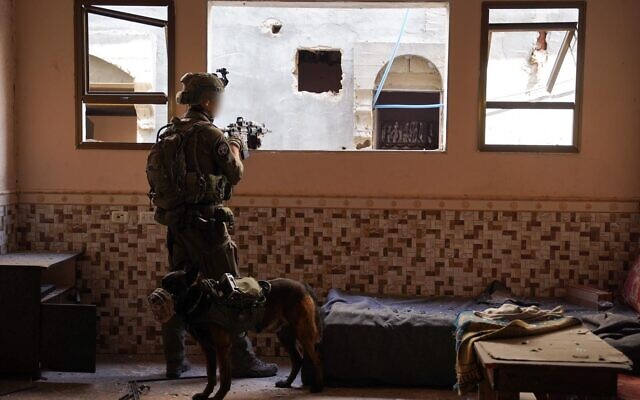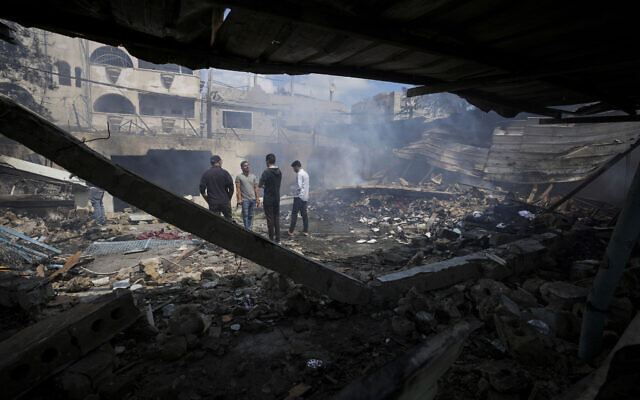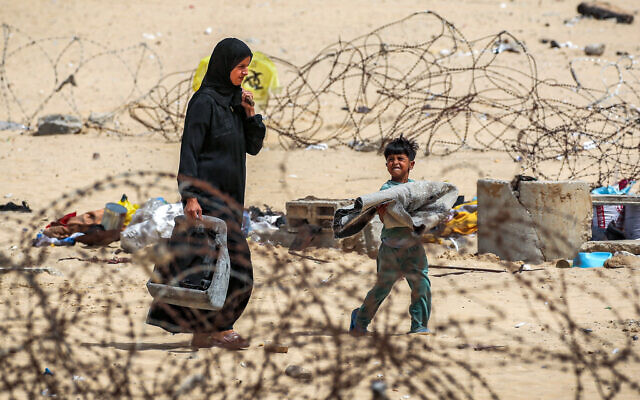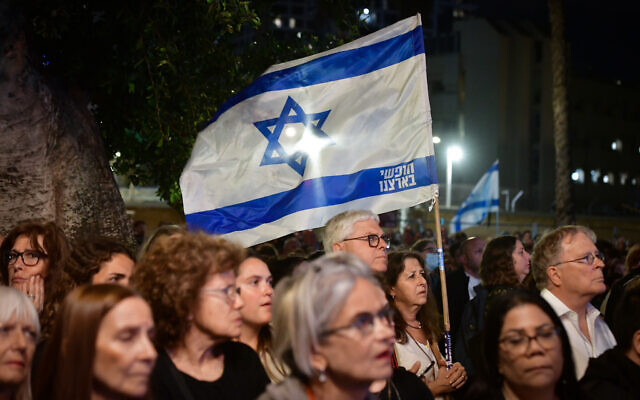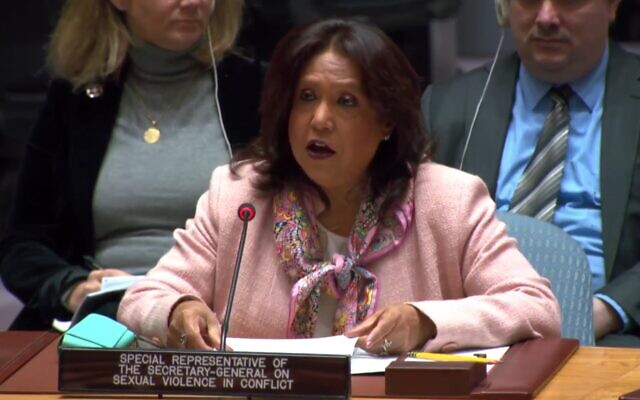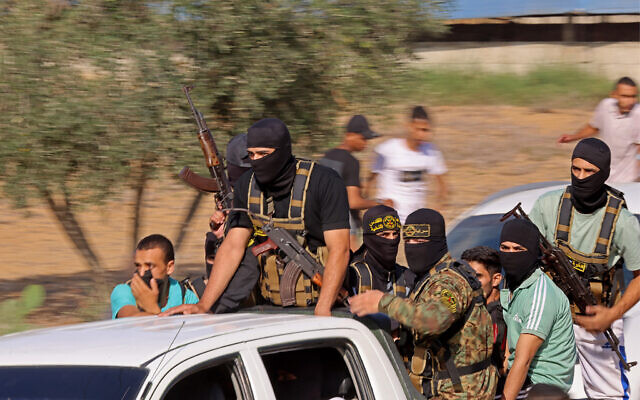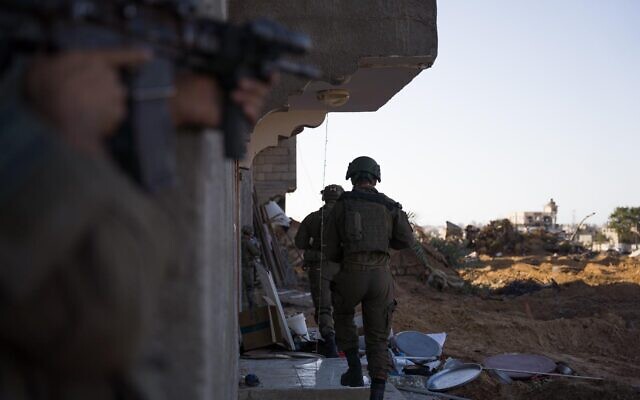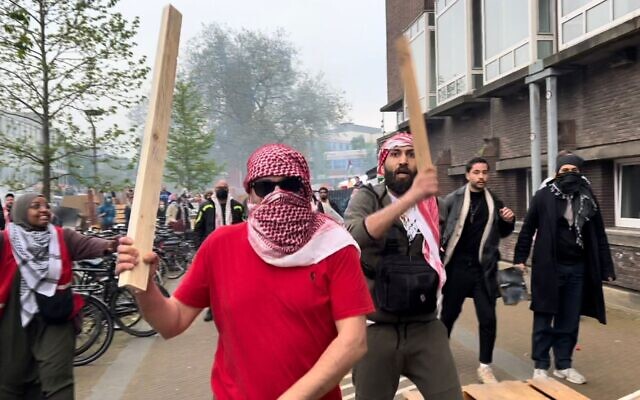Hamas official who sought endless war after Oct. 7 says it could put down arms for 2-state deal
Khalil al-Hayya’s comments to AP appear to contradict official policy of destroying Jewish state, but in separate interview he indicates eased stance would be temporary
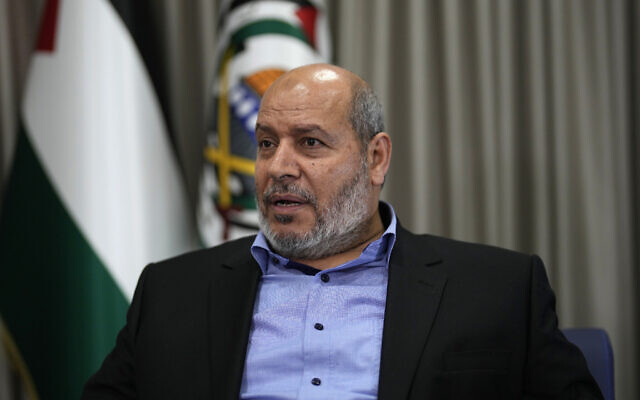
ISTANBUL, Turkey — A senior member of Hamas’s Qatar-based politburo said in an interview with The Associated Press on Wednesday that the terrorist group is willing to agree to a truce of five years or more with Israel and that it would lay down its weapons and convert into a political party if an independent Palestinian state is established along pre-1967 borders.
However, in separate comments published by the London-based Arabic paper Al-Araby Al-Jadeed, the same official, Khalil al-Hayya, indicated this would only be a temporary stance and that the Palestinians retain their “historic right to all Palestinian lands.”
Al-Hayya also specified in the AP interview that the envisaged Palestinian state would necessitate “the return of Palestinian refugees” to today’s Israel. The Palestinian demand for a so-called “right of return” provides for up to six million descendants of refugees entering Israel — a demand dismissed by Israel as seeking to destroy it as a Jewish majority state.
Al-Hayya’s comments came amid a stalemate in months of talks for a truce and a hostage release. The suggestion that Hamas could disarm appeared to mark a potential departure by the terror group, which is officially committed to Israel’s destruction.
It was also starkly at odds with an October interview by al-Hayya in which he said the goal of the October 7 massacres in southern Israel was to plunge the entire region into conflict and have a permanent state of war on Israel’s borders.
It’s also unlikely Israel would consider such a scenario. It has vowed to crush Hamas after thousands of terrorists led by the organization stormed southern Israel on October 7 to kill nearly 1,200 people, mainly civilians, and take 253 hostages.
Moreover, Prime Minister Benjamin Netanyahu and his government are overwhelmingly opposed to the creation of a Palestinian state on lands Israel captured during the Six Day War in June 1967.
Al-Hayya, a high-ranking Hamas official who has represented the Palestinian terrorists in negotiations for a cease-fire and hostage exchange, struck a tone that was sometimes defiant, and at other times ostensibly conciliatory.
Speaking to the AP in Istanbul, al-Hayya said the Islamist terror group wants to join the Palestine Liberation Organization — which is headed by Hamas’s bitter rival, the secularist Fatah faction, and which officially claims to seek coexistence alongside Israel — to form a unified government for Gaza and the West Bank. He said Hamas would accept “a fully sovereign Palestinian state in the West Bank and Gaza Strip and the return of Palestinian refugees in accordance with the international resolutions,” along Israel’s pre-1967 borders.
If that happens, he said, Hamas’s military wing, the al-Qassam Brigades, would be dissolved.
“All the experiences of people who fought against occupiers, when they became independent and obtained their rights and their state, what have these forces done? They have turned into political parties and their defending fighting forces have turned into the national army,” he said.

Over the years, Hamas has sometimes moderated its public position concerning the possibility of a Palestinian state alongside Israel.
Hamas’s 1988 founding charter, a virulently antisemitic document rife with outlandish tropes about a worldwide Jewish conspiracy, professes the terror group’s commitment to armed struggle while rejecting any territorial concessions to “the warmongering Jews.”
In a 2017 bid to curry international favor, Hamas revised the document, claiming the group’s struggle was not against Jews, but rather against “the Zionist project.” But Hamas’s political program still officially “rejects any alternative to the full liberation of Palestine, from the river to the sea” — referring to the area reaching from the Jordan River to the Mediterranean Sea, which includes lands that now make up Israel.
It also carried out a vicious campaign of terror attacks and suicide bombings in response to the 1993 Oslo Accords between Israel and the Palestinians that strove for a two-state solution.
An unchanged ‘historic right to all Palestinian lands’
Al-Hayya, speaking to the AP on Wednesday, did not say whether his conditional apparent embrace of a two-state solution would amount to an end to the Palestinian conflict with Israel or would merely constitute an interim step toward the group’s stated goal of destroying the Jewish state.
However, in a separate interview with the Dubai-based Asharq News, also Wednesday, al-Hayya said that while Hamas would not be opposed at this stage to the creation of a Palestinian state along the 1967 borders comprising the West Bank and Gaza, including the return of Palestinian refugees, an agreement to this effect would only be temporary and insisted on the Palestinians’ “historic right to all Palestinian lands.”

There was no immediate reaction to al-Hayya’s comments from Israel or the Palestinian Authority, the internationally recognized self-ruled government that Hamas drove out of Gaza upon seizing the Strip in 2007, a year after the terror group had won elections to the Palestinian Authority parliament. After Hamas’s takeover of Gaza, the PA was left with administering semi-autonomous pockets of the West Bank.
The PA hopes to establish an independent state in the West Bank, East Jerusalem and Gaza — areas captured by Israel in the 1967 war. Israel has since annexed East Jerusalem.
In 2005, the government of then-prime minister Ariel Sharon unilaterally withdrew Israeli troops and settlers from the Gaza Strip.

The war in Gaza, sparked by Hamas’s brutal October 7 onslaught, has dragged on for nearly seven months, and negotiations for a truce, mediated by Qatar, Egypt and the United States, have stalled.
Some 80 percent of Gaza’s population of 2.3 million has been displaced in the fighting, and hunger conditions in the Strip approach famine, according to United Nations officials.

The Hamas-run Gaza health ministry says more than 34,000 people in the Strip have been killed in the fighting so far, a figure that cannot be independently verified, and includes some 13,000 Hamas gunmen Israel says it has killed in battle. Israel also says it killed some 1,000 terrorists inside Israel on October 7.
Two hundred and sixty-one IDF soldiers have been killed in the Gaza offensive.
Israel is now preparing an offensive in the Strip’s southernmost city, Rafah, where more than 1 million displaced Palestinians have sought shelter. According to Israel, such an offensive is necessary to dismantle four remaining Hamas battalions that are holed up in the city; Hamas’s army numbered 24 battalions at the start of the war.
Al-Hayya said an Israeli offensive in Rafah would not succeed in destroying Hamas. He said contacts between the political leadership outside and military leadership inside Gaza are “uninterrupted” by the war, and “contacts, decisions and directions are made in consultation” between the two groups.

Israeli forces “have not destroyed more than 20% of [Hamas’s] capabilities, neither human nor in the field,” he asserted. “If they can’t finish [Hamas] off, what is the solution? The solution is to go to consensus.”
No hostage releases without end to war
In November, a weeklong truce saw the release of more than 100 hostages in exchange for some 240 Palestinian security prisoners held in Israel. But talks for a longer-term truce and release of the remaining hostages are now frozen, with each side accusing the other of intransigence. Key interlocutor Qatar has said in recent days that it is undertaking a “reassessment” of its role as mediator.
Most of Hamas’s top political officials, previously based in Qatar, have left the Gulf country in the past week and traveled to Turkey, where Hamas political leader Ismail Haniyeh met with Turkish President Recep Tayyip Erdogan on Saturday. Al-Hayya denied a permanent move of the group’s main political office is in the works and said Hamas wants to see Qatar continue in its capacity as a mediator in the talks.
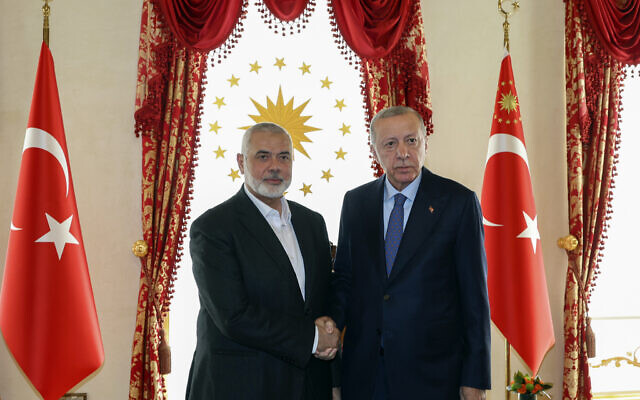
Israeli and US officials have accused Hamas of not being serious about a deal.
Al-Hayya denied this, saying Hamas has made concessions regarding the number of Palestinian security prisoners it wants to be released in exchange for the remaining Israeli hostages. He said the group does not know exactly how many hostages remain in Gaza and are still alive.
But he said Hamas will not back down from its demands for a permanent ceasefire and full withdrawal of Israeli troops — demands presented by Hamas negotiators as a condition for any further hostage releases. Israel has rejected those demands as “delusional” and says it will continue military operations until Hamas is definitively defeated and will retain a security presence in Gaza afterward.
“If we are not assured the war will end, why would I hand over the prisoners?” the Hamas leader said of the remaining hostages.
Implicit threat to the US
Al-Hayya also implicitly threatened that Hamas would attack Israeli or other forces who might be stationed around a floating pier the US is scrambling to build along Gaza’s coastline to deliver aid by sea.
“We categorically reject any non-Palestinian presence in Gaza, whether at sea or on land, and we will deal with any military force present in these places, Israeli or otherwise… as an occupying power,” he said.
Al-Hayya said Hamas does not regret the October 7 attacks, despite the destruction it has brought down on Gaza and its people. He denied that Hamas terrorists had targeted civilians during the attacks — despite overwhelming evidence to the contrary, including the terrorists’ recording of their atrocities — and said the operation succeeded in its goal of bringing the Palestinian issue back to the world’s attention.

In comments to The New York Times published a month after the shock assault, al-Hayya had said that the goal of the assault was to “change the entire equation,” and to ensure that “no one in the region is experiencing calm.”
“This battle was not because we wanted fuel or laborers,” al-Hayya said at the time. “It did not seek to improve the situation in Gaza. This battle is to completely overthrow the situation.”
Al-Hayya told the AP that Israeli attempts to eradicate Hamas would ultimately fail to prevent future Palestinian armed uprisings.
“Let’s say that they have destroyed Hamas. Are the Palestinian people gone?” he asked.



